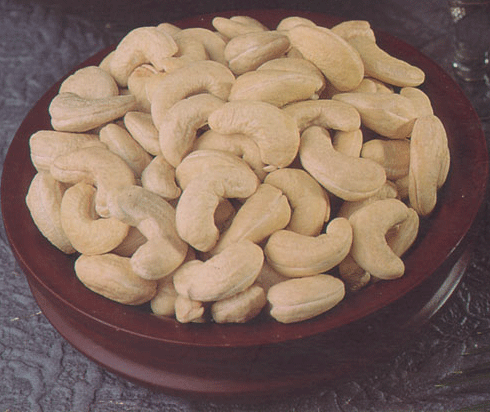|
Go Nuts Go Healthy
Throughout the history, nuts have been a food staple around the world. Tree nuts are a traditional part of many ethic cuisines, providing rich flavours that complement just about any herb, spice, fruit, vegetable, cheese or meat. Almonds, Cashews, hazelnuts, macadamias, pistachios and walnuts… …. Tree nuts are always a hit and a delicious addition to just about any recipe. As part of a main dish, salad, sandwich or dessert, or as snacks to enjoy a casual part, nuts are as tasty as they are versatile.
So, whether your idea of entertaining is a special meal for your family, a casual picnic or a party, a formal dinner or an evening experimenting with ethnic or regional cuisines, tree nuts are a perfect addition to the menu.
Did you know that….. …..
Tree nuts are cholesterol-free and chock-full of important nutrients, including protein and fibre. They’re also a great source of vitamins such as folic acid, niacin and vitamins E and B6 and minerals like magnesium, copper, zinc, selenium, phosphorus and potassium.
ON AN AVERAGE, 85% OF THE FAT IN NUTS IS UNSATURATED
Yes, nuts are relatively high in fat, but most of the fat is unsaturated. It’s important to look at not only the amount of fat you eat, but also the type of fat. Saturated fat can raise blood cholesterol levels, which can increase the risk of heart attack or stroke. Unsaturated fats, such as polyunsaturated and monounsaturated fats, can actually decrease low-density lipoprotein (LDL, or ‘bad’ cholesterol) levels.
ALL THREE TYPES OF FATS ARE FOUND IN VARYING AMOUNTS IN FOODS
Monounsaturated fats are often liquid at room temperature and come mostly from plant foods such as avocados, olive oil and nuts including almonds, cashews, hazelnuts, macadamias, pecans and pistachios.
Polyunsaturated fats are often liquid at room temperature and come mostly from plant food such as walnuts, safflower, corn and sunflower oils.
Saturated fats are often solid at room temperature and are found mostly n animal foods like lard, butter, the fat on meat and skin on chicken.
EATING NUTS MAY HELP REDUCE THE RISK OF HEART DISEASE
Resent medical studies indicate that nuts may play an important role in reducing the risk of heart disease. In one study, researchers found that although the benefits were greatest for frequent nut eaters, people who ate nuts even once a week, had 25% less heart disease them those who avoided nuts completely. In another study, women who ate five or more ounces of nuts per week had one-third fewer heart attacks than those who rarely or never ate nuts. Similar findings have been seen in men.
MONOSATURATED FATS
Numerous studies have looked at the effect of monounsaturated fats on LDL (‘bad’) cholesterol. It appears that a diet high in monounsaturated fats can reduce the level of artery-damaging LDL cholesterol without lowering HDL cholesterol (high-density lipoprotein or ‘good’ cholesterol). In one study, people who had been following a low-fat diet (30% of calories from fat) were asked to increase their fat intake to 37% calories. The additional dietary fat came from nuts and was primarily monounsaturated. Even with a higher fat intake, the study participants saw reductions in their LDL cholesterol levels.
OMEGA-3FATTY ACIDS
Omega-3 fatty acids are commonly found in fish oils, but did you know that walnuts are a great ‘non-fish’ source of this important nutrient? In addition to helping fight heart disease, omega-3’s have also shown promise against arthritis and other inflammatory diseases.
YOU CAN EAT NUTS EVEN IF YOU’RE WATCHING YOUR WEIGHT
Experts have found that including nuts in the diet does not appear to cause weight gain as long as total calories are controlled. Furthermore, eating just a handful (or more ounce) of nuts a day may help curb your appetite,
NUTS CONTAIN ANTIOXIDANTS AND PHYTOCHEMICALS
Researches are continually discovering important information about the roles of antioxidants and phyto-chemicals in the prevention of chronic disease. Antioxidants protect against oxidation, or damage to cells in the body. Oxidation may play a role in the development of cancer, diabetes, heart and lung disease and cataracts. Common examples of oxidation in everyday life include the rusting of metal and the browning of fruit. Several recent studies show that Vitamin E specifically may reduce the risk for cardiovascular disease and certain cancers. Some nuts, including almonds, hazelnuts, pecans and Brazils, are good sources of antioxidants such as vitamin E and selenium.
NUTS FIT INTO A HEALTHY LIFESTYLE
In fact, experts recommend eating a variety of foods from the US Food Guide Pyramid every day in order to get the nutrients and calories you need. Nuts fall into the Meat, Poultry, Fish, Dry Beans And Nuts Group. The recommended number of servings from this group is 2-3 per day, or 5-7 ounces of cooked lean meat. One-third of a cup of nuts is equal to one ounce of cooked lean meat.
NUTRITION IN A NUT SHELL
We all have our favourites when it comes to tree nuts. Fortunately, all nuts offer nutritional benefits. Some tree nuts are higher in vitamin E or selenium; others are higher in copper or zinc. By eating a mixture of tree nuts, you are sure to get a variety of important vitamin s and minerals.
The Health Nut

The major causes of death in developed populations are first, arterial disease which results in heart attack and stroke and secondly, cancer of certain organs such as the lung, breast and colon. These disorders have also emerged among developing people and are increasing rapidly.
There is a wealth of evidence that a major cause of both arterial disease and cancer is an unbalanced diet characterized by a deficiency of plant foods and an excess of animal foods. Most important is the evidence that habitual consumption of diets high in plant foods and low in animal foods strongly protects against the development of arterial disease and cancer.
The reasons for the protective effect of plant foods are many including the facts that such foods are generally;
· Low in saturated fat
· High in monounsaturated and polysaturated fat
· Free of cholesterol
· Rich in fibre
· High in potassium salt and low in sodium salt
· High in vitamins and antioxidants
· Rich in a variety of other nutrients such as magnesium and phyto-estrogens
Nuts possess all these flavourable nutritional characteristics. Of particular important is their high mono unsaturated fat content, which can correct abnormal blood cholesterol level and hence reduce the development of arterial disease. This oil makes up 75% of the nut and 80% of the oil is monounsaturated. This is similar to olive oil consumption of which is thought to explain the relatively low incidence of coronary heart disease in Mediterranean people.
These promising results need to be confirmed in the long-term studies and the ideal would be large interaction studies, which have demonstrated that frequent nut consumption significantly reduces the risk of heart attack.
In summary, nuts have the favourable nutritional features of plant foods in general and of monounsaturates in particular. The challenge is to realize the potential.
|





